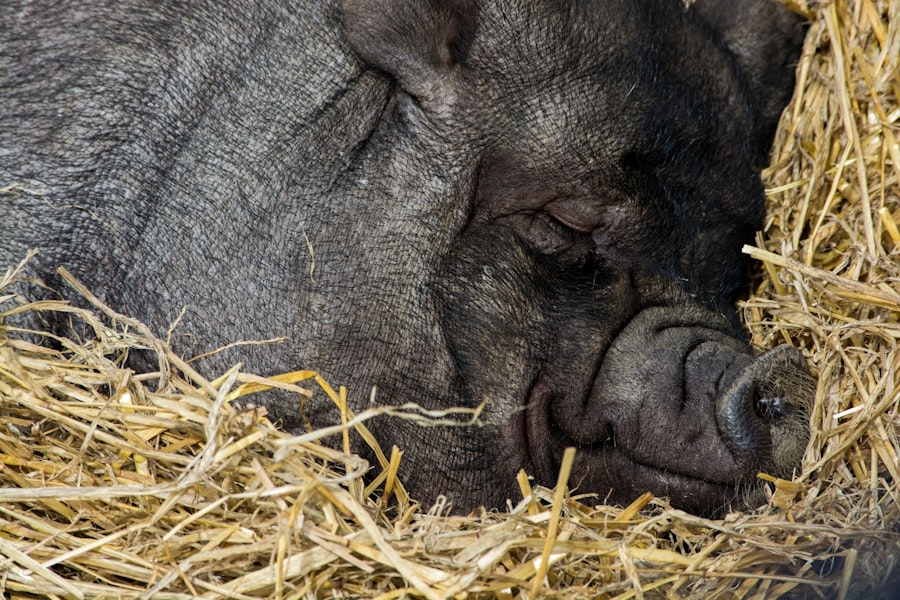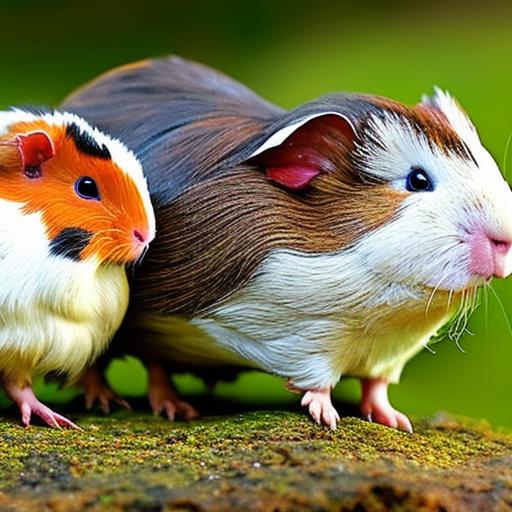Keeping guinea pigs and chickens together is a practice that has been gaining popularity in recent years. Many people are discovering the benefits of having these two animals coexist in their backyard or farm. In this blog post, we will explore the advantages of keeping guinea pigs and chickens together, as well as the factors to consider before doing so. We will also discuss the housing and feeding requirements for both animals, as well as the potential health concerns and behavioral considerations that may arise. By the end of this article, you will have a better understanding of whether keeping guinea pigs and chickens together is right for you.
Key Takeaways
- Keeping guinea pigs and chickens together is possible and can have benefits.
- Benefits include pest control, companionship, and waste management.
- Factors to consider include space, temperament, and predator risk.
- Housing requirements include separate areas for sleeping and feeding.
- Feeding requirements include separate food and water sources.
- Health concerns include disease transmission and parasites.
- Behavioral considerations include social hierarchy and aggression.
- Tips for introducing include gradual introduction and supervision.
- Common challenges include aggression and stress.
- Conclusion: Keeping guinea pigs and chickens together can be a rewarding experience, but requires careful consideration and management.
Benefits of keeping guinea pigs and chickens together
One of the main benefits of keeping guinea pigs and chickens together is companionship. Guinea pigs are social animals that thrive in the company of others, and having chickens around can provide them with the companionship they need. Chickens, on the other hand, are flock animals and enjoy being part of a group. Having guinea pigs around can fulfill their need for social interaction.
Another benefit of keeping these two animals together is pest control. Chickens are natural foragers and love to scratch and peck at the ground in search of insects and other small creatures. Guinea pigs, on the other hand, are herbivores and enjoy grazing on grass and other vegetation. By keeping them together, you can create a natural pest control system where the chickens help keep the insect population in check while the guinea pigs help maintain the grass and vegetation.
Factors to consider before keeping guinea pigs and chickens together
Before deciding to keep guinea pigs and chickens together, there are several factors that need to be considered. One important factor is space. Both guinea pigs and chickens require adequate space to roam and exercise. It is important to ensure that you have enough space to accommodate both animals comfortably.
Another factor to consider is temperament. Guinea pigs are generally docile and gentle animals, while chickens can be more assertive and territorial. It is important to observe the behavior of your chickens and guinea pigs before introducing them to each other. If your chickens show signs of aggression or if your guinea pigs seem fearful, it may not be a good idea to keep them together.
Diet is another important factor to consider. Guinea pigs have specific dietary needs and require a diet that is high in fiber and vitamin C. Chickens, on the other hand, require a diet that is high in protein. It is important to ensure that both animals are receiving the appropriate diet to maintain their health.
Housing requirements for guinea pigs and chickens
When it comes to housing requirements, guinea pigs and chickens have different needs. Guinea pigs require a secure enclosure that provides them with plenty of space to move around and explore. They also need a sheltered area where they can retreat to when they feel the need for privacy or protection from the elements.
Chickens, on the other hand, require a coop that provides them with protection from predators and the elements. The coop should be well-ventilated and have enough space for the chickens to move around comfortably. It should also have nesting boxes where the hens can lay their eggs.
To create a safe and comfortable living space for both animals, you can consider building a shared enclosure that has separate areas for the guinea pigs and chickens. This way, they can interact with each other while still having their own space to retreat to when needed.
Feeding requirements for guinea pigs and chickens
Guinea pigs have specific dietary needs and require a diet that is high in fiber and vitamin C. They should be fed a variety of fresh vegetables, hay, and pellets that are specifically formulated for guinea pigs. It is important to provide them with fresh water at all times.
Chickens, on the other hand, require a diet that is high in protein. They should be fed a balanced diet that consists of a combination of commercial chicken feed, grains, and fresh fruits and vegetables. It is important to provide them with fresh water and to ensure that their feed is always available.
When keeping guinea pigs and chickens together, it is important to ensure that both animals are receiving the appropriate diet. You can provide separate feeding areas for each animal to prevent them from eating each other’s food.
Health concerns when keeping guinea pigs and chickens together

When keeping guinea pigs and chickens together, there are several health concerns that may arise. One concern is the transmission of diseases. Chickens can carry diseases such as salmonella, which can be harmful to guinea pigs. It is important to practice good hygiene and to regularly clean and disinfect the shared living space to prevent the spread of diseases.
Another health concern is the potential for injury. Chickens have sharp beaks and claws, which can cause harm to guinea pigs if they become aggressive. It is important to closely monitor their interactions and to separate them if any signs of aggression are observed.
To prevent common health issues, it is important to provide both animals with regular veterinary care. This includes vaccinations, deworming, and regular check-ups. It is also important to provide them with a clean and sanitary living environment.
Behavioral considerations for guinea pigs and chickens living together
Guinea pigs and chickens have different behavioral characteristics that need to be taken into consideration when keeping them together. Guinea pigs are social animals that enjoy the company of others. They may become stressed or anxious if they are kept alone or if they do not have enough social interaction.
Chickens, on the other hand, are flock animals and enjoy being part of a group. They have a hierarchical social structure and may display aggressive behavior towards each other if they feel threatened or if there is competition for resources.
To manage their behavior when living together, it is important to provide both animals with plenty of social interaction and to ensure that they have enough space to move around comfortably. It is also important to provide them with plenty of enrichment activities, such as toys and hiding places, to keep them mentally stimulated.
Tips for introducing guinea pigs and chickens to each other
When introducing guinea pigs and chickens to each other, it is important to do so slowly and carefully. Start by placing their enclosures near each other so that they can become familiar with each other’s presence. Gradually allow them to interact under close supervision.
It is important to closely monitor their interactions and to separate them if any signs of aggression or stress are observed. Provide plenty of hiding places and separate feeding areas to prevent competition for resources.
It may take some time for the animals to adjust to each other’s presence, so be patient and allow them to set their own boundaries. If they do not get along, it may be necessary to keep them in separate enclosures.
Common challenges when keeping guinea pigs and chickens together
Keeping guinea pigs and chickens together can come with its own set of challenges. One common challenge is the potential for aggression between the animals. Chickens can be territorial and may become aggressive towards the guinea pigs if they feel threatened or if there is competition for resources.
Another challenge is the potential for injury. Chickens have sharp beaks and claws, which can cause harm to guinea pigs if they become aggressive. It is important to closely monitor their interactions and to separate them if any signs of aggression are observed.
To overcome these challenges, it is important to provide both animals with plenty of space and resources. This includes separate feeding areas, hiding places, and toys. It is also important to closely monitor their interactions and to separate them if any signs of aggression or stress are observed.
Is keeping guinea pigs and chickens together right for you?
In conclusion, keeping guinea pigs and chickens together can have several benefits, such as companionship and pest control. However, there are several factors to consider before deciding to keep them together, such as space, temperament, and diet. It is important to provide both animals with appropriate housing and feeding requirements, as well as regular veterinary care.
There are also potential health concerns and behavioral considerations that need to be taken into account. It is important to closely monitor their interactions and to separate them if any signs of aggression or stress are observed. It is also important to provide them with plenty of space and resources to prevent competition for resources.
Before deciding to keep guinea pigs and chickens together, it is important to carefully consider whether it is the right choice for you. If you are unsure, it may be helpful to consult with a veterinarian or experienced animal keeper who can provide guidance and advice.
Additional resources:
– “Keeping Chickens: A Beginner’s Guide” by Jeremy Hobson
– “The Guinea Pig Handbook” by Sharon Vanderlip
– “Backyard Chickens: The Essential Guide to Choosing the Perfect Breed” by Andy Schneider “The Guinea Pig Handbook” by Sharon Vanderlip is a comprehensive guide that provides essential information on the care, health, and behavior of guinea pigs. From choosing the right guinea pig to creating a suitable habitat, this book covers all aspects of guinea pig ownership. Vanderlip’s expertise as a veterinarian shines through as she offers practical advice on nutrition, grooming, and handling these adorable pets. With detailed explanations and helpful tips, “The Guinea Pig Handbook” is a must-have resource for both new and experienced guinea pig owners.
On the other hand, “Backyard Chickens: The Essential Guide to Choosing the Perfect Breed” by Andy Schneider is a valuable resource for anyone interested in raising chickens in their backyard. Schneider’s book covers everything from selecting the right breed for your needs to providing proper housing and nutrition. With his extensive knowledge and experience as a chicken expert, Schneider offers practical advice on topics such as egg production, health care, and predator protection. Whether you are a beginner or an experienced chicken keeper, “Backyard Chickens” is an indispensable guide that will help you successfully raise and enjoy these feathered friends in your own backyard.
If you’re considering keeping guinea pigs and chickens together, it’s important to understand the dynamics between these two animals. While they can coexist peacefully, there are certain factors to consider. In a related article on Poultry Wizard, you can find valuable insights on creating a suitable chicken coop interior that accommodates both guinea pigs and chickens. This article provides practical ideas and tips to ensure the comfort and safety of both species. To learn more about this topic, check out the article here. Additionally, if you’re interested in renting a chicken coop or determining how many chickens you need for a family of four, Poultry Wizard offers informative articles on these subjects as well.
FAQs
What are guinea pigs and chickens?
Guinea pigs are small, social rodents that are often kept as pets. Chickens are domesticated birds that are commonly raised for their meat and eggs.
Can guinea pigs and chickens be kept together?
It is not recommended to keep guinea pigs and chickens together. They have different dietary needs and social behaviors, and may not get along well.
What are the risks of keeping guinea pigs and chickens together?
If guinea pigs and chickens are kept together, there is a risk of injury or death to the guinea pigs. Chickens may peck at or attack the guinea pigs, and guinea pigs may become stressed or injured trying to escape.
What should I do if I want to keep both guinea pigs and chickens?
If you want to keep both guinea pigs and chickens, it is best to keep them in separate enclosures. Guinea pigs should have a spacious cage with plenty of hiding places and toys, while chickens need a coop and outdoor space to roam.
Can guinea pigs and chickens share the same food?
No, guinea pigs and chickens have different dietary needs. Guinea pigs require a diet high in vitamin C and fiber, while chickens need a diet high in protein. Feeding them the wrong food can lead to health problems.
What are some signs that guinea pigs and chickens are not getting along?
Signs that guinea pigs and chickens are not getting along include aggression, chasing, biting, and vocalizations such as squealing or squawking. If you notice these behaviors, it is best to separate them immediately.
Meet Walter, the feathered-friend fanatic of Florida! Nestled in the sunshine state, Walter struts through life with his feathered companions, clucking his way to happiness. With a coop that’s fancier than a five-star hotel, he’s the Don Juan of the chicken world. When he’s not teaching his hens to do the cha-cha, you’ll find him in a heated debate with his prized rooster, Sir Clucks-a-Lot. Walter’s poultry passion is no yolk; he’s the sunny-side-up guy you never knew you needed in your flock of friends!







